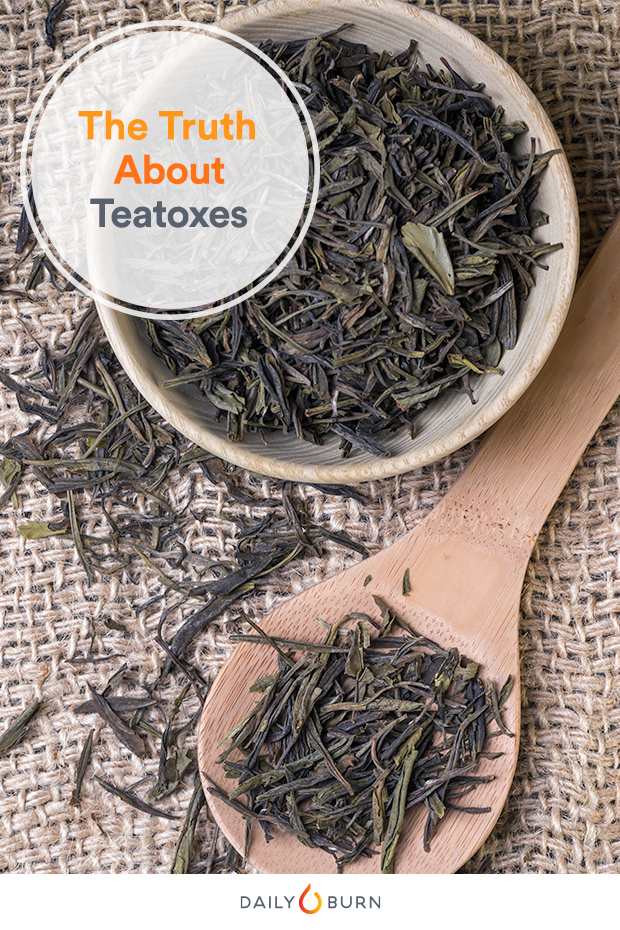
When Kylie Jenner does something on social media these days, almost everyone takes note. And when it comes to her flat belly (pictured below), well, everyone’s interested in how she looks so fit. One possible answer, according to her Instagram: teatoxing, the latest celeb trend in the wellness world. By drinking two teas — usually an a.m.-wake-up blend and an afternoon or evening detox tea — manufacturers claim you’ll “detoxify the body,” and maybe get some weight loss assistance, too. Jenner’s brand of choice is Lyfe Tea, and a host of other celebrities including Vanessa Hudgens, Britney Spears, Nicki Minaj and Hilary Duff have all plugged various brands of teatoxes in recent months, including FitTea and BooTea. But do these new, trendy brews actually make good on their claims?
RELATED: Could Eating Charcoal Help You Detox?
Why Teatoxes?
For some, the appeal of these teatoxes — almost all of which contain senna, a natural laxative, or another diuretic or laxative ingredient (more on that later…) — is that they’re not starvation-based. Unlike intense, liquid-only juice cleanses, you can eat normally during a teatox, while adding in the brews throughout the day.
But whereas juice cleanses can be unsustainable, and borderline dangerous in some cases, “with a teatox, you don’t have to really change what you’re eating. The problem with juice cleanses is you’re not eating and you’re not getting any fiber from the juices,” says Priya Lawrence, MS, RD, CBN, of Tried and True Nutrition in New York City.
That said, the varying types of teatoxes all recommend sticking to a clean diet of proteins, fruits and vegetables, as well as getting regular exercise. “You can’t be drinking a detoxifying tea but also not sleeping and having alcohol. For it to be effective, it needs to be part of a larger plan that works for you,” notes Laura Lagano, MS, RDN, CDN, an integrative clinical nutritionist in Hoboken, NJ.

Does It Really Work?
“Since all of the teatoxes push a healthy diet and exercise, any weight you lose is probably because you’re watching what you’re eating and increasing your activity.”
But even if you’re doing everything that’s recommended on your individual teatox, it’s very possible — even likely — that any weight loss results you’re seeing aren’t from the tea at all. “Since all of the teatoxes push a healthy diet and exercise, any weight you lose is probably because you’re watching what you’re eating and increasing your activity,” says Lawrence.
Temporary weight loss also might occur because the evening teas usually contain senna, an herb which has a laxative effect that, in some cases, is, well, pretty intense. “If you have any gastrointestinal distress [from your teatox], that’s not normal,” warns Lawrence. “There’s no reason why you should feel sick. I think that’s what people think the ‘cleanse’ part is, but that’s not the way it’s supposed to work.”
RELATED: The 10-Day Wheat Detox You Need to Try
However, it’s important to also note claims that these teatoxes may potentially disrupt your menstrual cycle, as recently reported by Broadly. And because senna is a laxative (even if its FDA-approved for over-the-counter use), it can cause some of the same side effects any other laxative would. So drink with caution — and always consult with your doctor first before starting any new medical or dietary regimen.
RELATED: 5 Healthier Ways to Detox — No Juice Cleanse Required
Keep in mind, tea can help you detox — you just need to find the right blend. “Dandelion tea is a fantastic detoxifier. Maybe you can’t ‘see’ this blend working,” says Lagano, but dandelion tea can help expedite waste removal from your cells, she says.
The Bottom Line
The power of diet and exercise does (and always will) reign supreme over any quick fix. As Lagano sees it: “The tea has to be a part of a healthy plan.”
Originally published December 2015. Updated July 2016.
